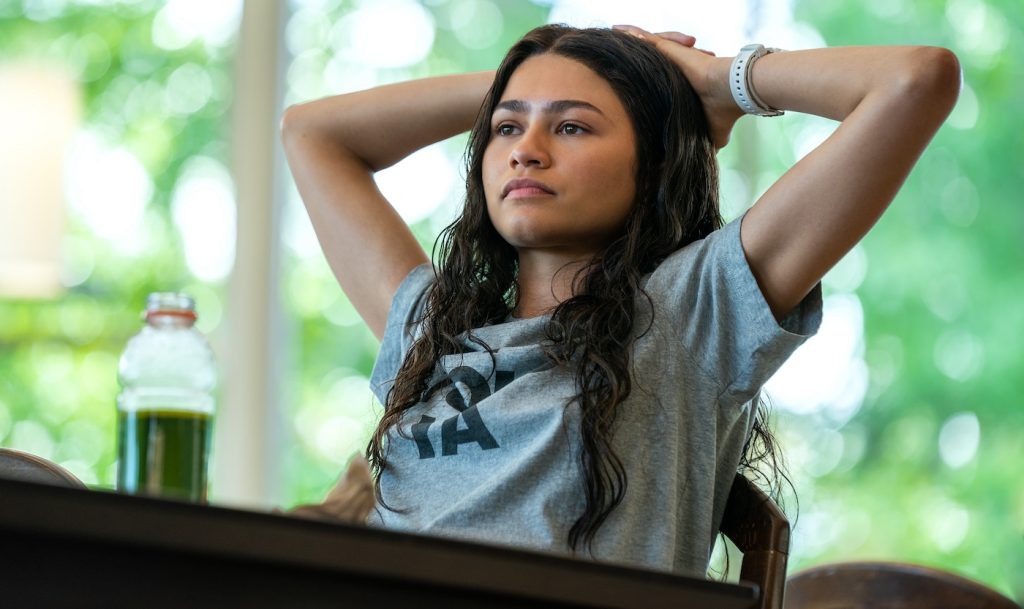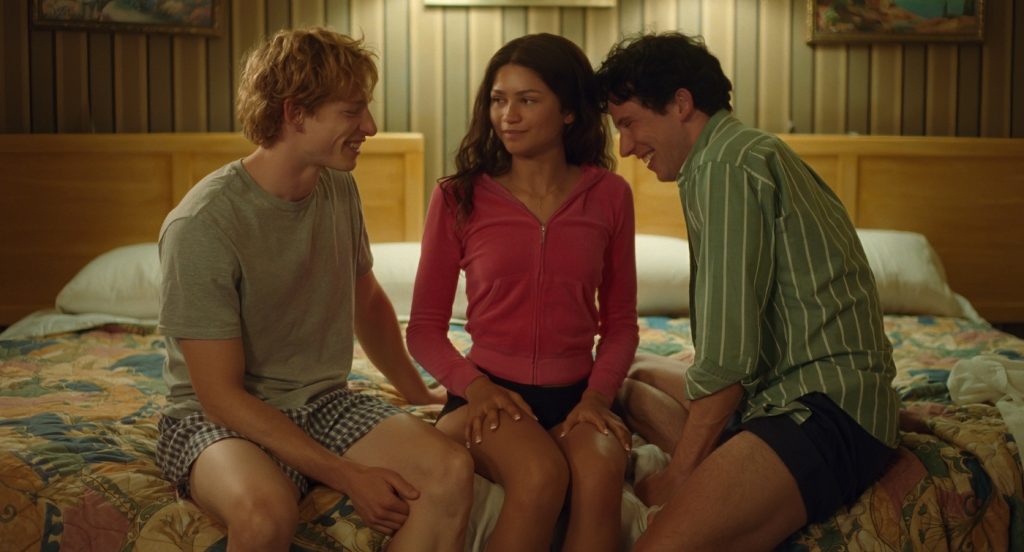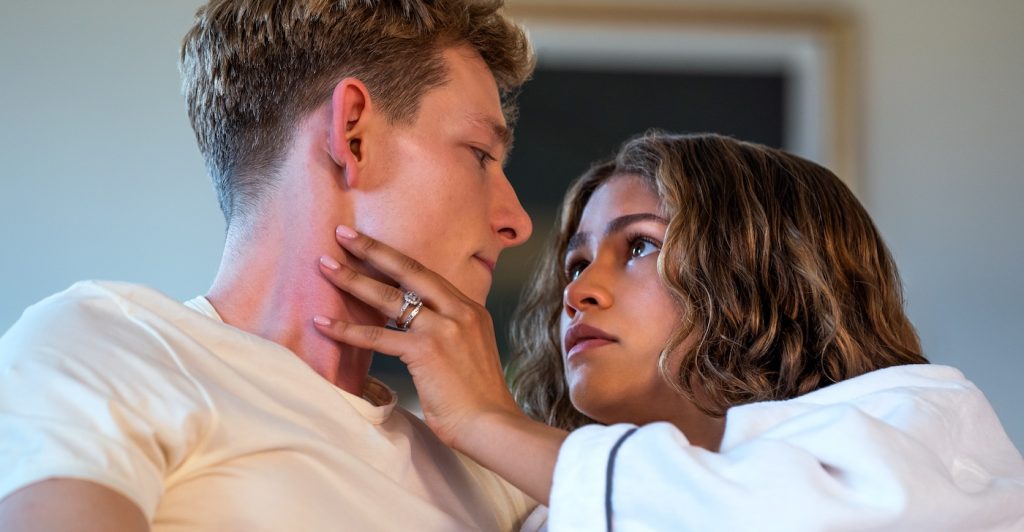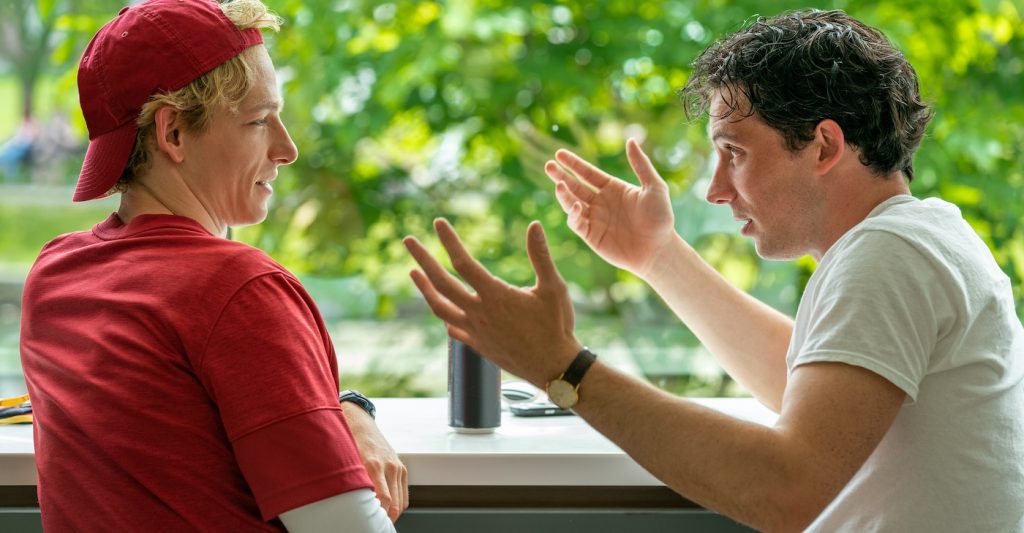“Challengers” Screenwriter Justin Kuritzkes on Acing his Zendaya-led Tennis Scorcher
Spoiler Alert: The following article contains spoilers for Challengers.
Back in 2018, playwright and author Justin Kuritzkes was obsessively consuming the world of elite tennis. As the first-time screenwriter conveyed to The Credits, it was better than anything in theaters or on the small screen — tennis was really just that good.
During that year’s U.S. Open match between Naomi Osaka and Serena Williams, a controversial call accused the latter player of receiving coaching from the sidelines. Thus, the nascent seed of what would eventually be Challengers — an unflinching, sexy drama tracing the volatile relationships between three tennis champions — was planted.
“Immediately that struck me as intensely cinematic — that you’re all alone on the court, there’s this person in the massive stadium who cares as much about what happens to you as you do, but you can’t talk to them,” Kuritzkes said in an interview. “And so, how could you have that conversation if you really needed to talk about something important beyond tennis, something that was going on with you guys, and what if it included the person who was across the net?”

While embarking on research, the writer (who is married to Past Lives director-writer Celine Song, another masterwork unpacking a triangular dynamic) developed a “deep sort of obsession with tennis to the point where I almost didn’t really want to write the movie because I just didn’t want to pollute my fandom of tennis.”

Kuritzkes began by pouring over the Grand Slam tournaments and Masters events, eventually finding his way to the Challenger tour, an international men’s series in the big leagues, where world-renowned players are often losing money competing for smaller cash prizes. Here, the scribe found compelling the idea of a stage where someone is “the best in the world at something and no one cares” and what it would mean for a player like that to go serve-to-serve with a famous counterpart.
When crafting the film’s nonlinear timeline, Kuritzkes was intentional about its scope, meaning that the arc of the narrative would trace the ups and downs of a professional athlete’s career lifespan. “You’re born when you’re of age, and you die when you’re useless when you’re 35—if you’re lucky,” he explained. “And as an artist, that was really terrifying to me to think about.”
The goal was to drop the audience into the final match with an underlying, frenetic layer of “unspoken tension,” which the movie would then unpack through jumps back in time. Because of this, Kuritzkes never considered flashbacks beyond the roughly 13-year period or included other people outside of Zendaya’s Tashi, Josh O’Connor’s Patrick, and Mike Faist’s Art.
“I wanted it to feel really claustrophobic,” he said. “I wanted to feel like the energy between them was so strong that it was almost like they were the only three people that existed in the world.”

Challengers, directed by Luca Guadagnino (Oscar-nominated for Call Me By Your Name) and produced by Amy Pascal, serves up an interwoven story of three elite tennis players, led by the indomitable Tashi Duncan, a junior player who is pro tennis’ next big thing. When a career-ending injury alters her path forever, she re-enters the stadium as a coach, eventually training her husband Art, who is facing off against his former childhood best friend and teammate — also Tashi’s ex-boyfriend. What unfolds is an all-consuming decade-long match between the trio on and off the court that stretches the limits of desire, control, and power.

“I kept asking myself, ‘What could I write that’s as good as tennis, and what would make tennis even better?’ And for me, the answer would be if I could know what was at stake for every player at each moment in the match,” Kuritzkes said. “Not just what the commentator could tell you on ESPN, but what’s really at stake personally.”
Ultimately, these characters are “three people who are capable of all kinds of things,” and Kuritzkes is hesitant to trap any one person into one villainous caricature or judgment.
“The goal for me is always to write characters that feel as kind and caring and selfish and petty and cruel and sweet and generous to the people I meet in real life,” the writer explained. “And so if you put three characters like that in a triangle together, it’s naturally not always going to look so cozy. But I hope it also doesn’t always look so cold.”
Already, the online discourse of the film has skewered Zendaya’s character as heinous and evil, but the reality is that Tashi is a “brilliant person,” Kuritzkes maintained, and the actor herself has defended her as a layered personality, having gone through a major trauma.
“Tashi is this character that’s on track to become a superstar. There’s nothing in her way. She has no real competitors because she’s just so far ahead of the pack,” Kuritzkes said. “And she’s not just supposed to do that for herself, but for her whole family. She’s supposed to really launch everybody who loves her into this new realm, this new way of moving through the world. And she’s known this since she was a little kid and has been working towards that. When that gets taken away from her, it’s a true existential crisis.”
Kuritzkes draws a plain distinction between Tashi’s talent and desires, meaning that her true character is revealed when she’s unwilling to give up the world of tennis despite the possibility that she could try a swing at anything else and succeed.
Because of the film’s fluidity in time, its climactic moment almost seems to be the film’s resolution itself. There’s a “love for the game” type of quality to the ending, where all of the players have gotten what they’ve needed; for Kuritzkes, it’s “irrelevant” what happens with the triangle afterward, as the match has, in essence, been played at its most effective caliber.
“I always knew that the movie was over the moment all of their cards were on the table, and the moment they were all, all of the sudden, being completely open with each other, and they were having this conversation on the tennis court that they couldn’t have in their intimate lives,” he said.
In the end, “they’re all playing the best tennis of their lives,” Kuritzkes said, volleying back and forth and communicating freely with one another. He continued, “Tennis was a natural setting for something like that because so much of tennis is about the controlling of energy. It’s an artificial container of life and the chaos of life,” as much as a movie is the same thing, and that seemed like a “natural place to live and to tell a story about love and desire and cruelty and kindness.”
With this debut feature, Kuritzkes said he was grateful to have worked alongside top-tier figures in the industry, from the creatives in front of and behind the camera to the below-the-line talent who brought his vision to life.
“It was really like getting admitted to a film school that you couldn’t pay for if you tried,” he said. “That was an incredible privilege for me as somebody who was really stepping onto a film set for the first time in my life, to be surrounded by these people who are so good at their jobs that they made it possible for me to feel like I could do mine.”
Featured image: Josh O’Connor stars as Patrick and Zendaya as Tashi in director Luca Guadagnino’s CHALLENGERS. An Amazon MGM Studios film. Photo credit: Niko Tavernise © 2024 Metro-Goldwyn-Mayer Pictures Inc. All Rights Reserved.



